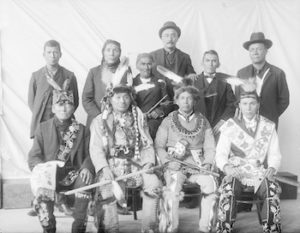
The Bonga Family
*Pierre Bonga's birth is celebrated on this date in 1770. He was a Black trapper and interpreter.
Born in Michigan, he was the son of Jean and Marie-Jeanne Bonga, an enslaved couple. Their family was brought to Mackinac Island in 1782 by their British master, Captain Daniel Robertson. His master took over command of Fort St. Joseph and served there from 1782 to 1787. Freed by Robertson before his departure, the Bonga couple married on June 25, 1794, in the Catholic church on Mackinac Island.
They stayed on the island and opened their first hotel. Jean Bonga died on Mackinac Island in 1795. Mackinac Island had long been a center of the fur trade between the Ojibwe and Ottawa people, done by white French and British traders. The population was descendants of French colonists and Métis people, and French was still the dominant language. Growing up on Mackinac Island, Bonga learned English and Ojibwe and became a trapper and a scout. He was called Makadewiiyas (black-skinned) in Ojibwe (his name was Mukadaweos).
He entered the fur trade in the region, first working for the Northwest Company of British Canada. He married an Ojibwe woman while operating in her people’s territory. Sources differ in Bonga’s marriage and family accounts. Their Black African and Native children were raised in the Ojibwe culture. Two of their sons followed him into the fur trade and established reputations as interpreters and guides. According to the National Park Service and the Wisconsin Historical Society, Bonga married an Ojibwe woman and had four children, including Stephen, George, Rosalie, and Charlotte.
He later worked for John Jacob Astor’s American Fur Company, primarily along the Red River of the North and near Lake Superior in present-day Wisconsin and Minnesota. Pierre Bonga died in 1831. In 1802, Pierre Bonga was reported to be working with the Northwest Company under Alexander Henry the Younger at the Red River of the North. Stephen and George Bonga established reputations as interpreters and guides in the fur trade. Stephen Bonga was a guide to Eastman Johnson when the American artist traveled to the Wisconsin frontier on a trip to his sister. Bonga introduced the Ojibwe people, which enabled Johnson to paint intimate studies of the people.